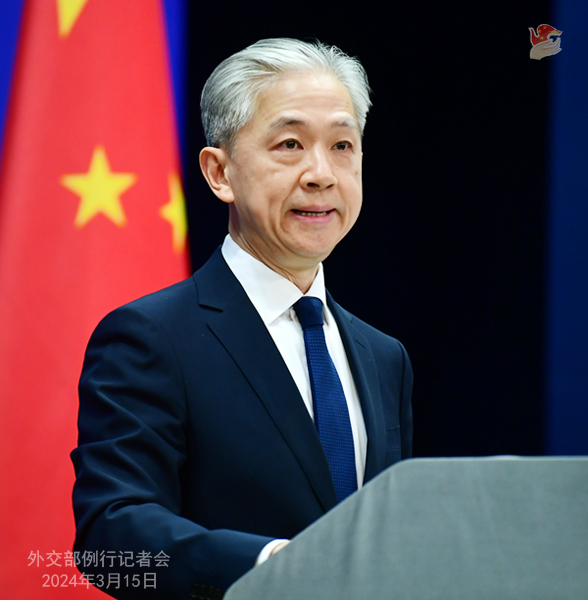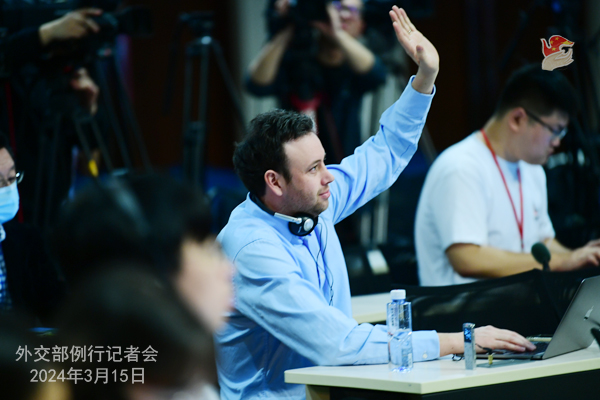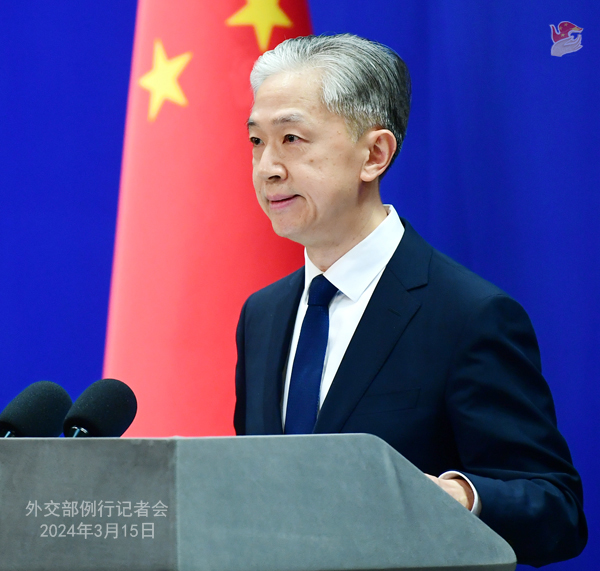
AFP: Former US Treasury Secretary Steven Mnuchin said he will build an investor group to acquire TikTok. What is your response?
Wang Wenbin: Yesterday we made clear China’s position on the US handling of TikTok. The spokesperson of China’s Ministry of Commerce has also stated China’s solemn position.
CCTV: The United Nations Development Programme released the Human Development Report 2023/2024 yesterday. The report shows that China’s human development index for 2022 rose to 0.788, ranking 75th in the world, up from 79th in 2021. What is your comment?
Wang Wenbin: We noted the report. China’s human development index (HDI) has increased from 0.499 in 1990 to 0.788 in 2022. China is the only country in the world that has leapt from the group of low human development to the group of high human development since the index was first measured in 1990.
The increase of China’s HDI is a result of the Communist Party of China practicing the people-centered development philosophy and putting the people at the core of the modernization endeavor. Since the beginning of reform and opening up, the population lifted out of poverty in China has accounted for over 70 percent of the world’s total. China has made the historic achievement of eliminating absolute poverty and realized the poverty reduction target of the UN 2030 Agenda for Sustainable Development 10 years ahead of schedule. Chinese people’s average life expectancy has increased to 78.2 years, per capita annual disposal income has reached close to RMB 40,000, and the country has the world’s largest and most promising middle-income group totaling over 400 million people. China has also set up the world’s largest education system, social security system and medical care system. The Chinese people now have an increasingly greater sense of gains, happiness and security. Chinese modernization, with its continued progress, will turn the Chinese people’s aspiration for a better life into reality, and improve the Chinese people’s living standard and quality.
We noted that the report by the UN Development Programme pointed out that the recovery in HDI values is unequal, the divergence between the very high and the low HDI groups of countries, after decades of convergence, is going up, and only about half of the least developed countries are projected to have reached or surpassed their pre-2019 HDI values. This highlights the urgency of making development the priority of the international agenda. The Global Development Initiative proposed by President Xi Jinping provides strong impetus for global development cooperation and the realization of sustainable development targets. We stand ready to continue working with all parties to deepen cooperation under the Global Development Initiative, accelerate the implementation of the UN 2030 Agenda for Sustainable Development, and make new contribution to enabling the people of all countries to live a happy life and realize well-rounded development.
Financial Times: If the US passes this bill which forces ByteDance to sell TikTok to US investors, what is China’s position?
Wang Wenbin: The Foreign Ministry and the Commerce Ministry made responses to relevant questions, which you may refer to.
Associated Press of Pakistan: In a letter to President Xi Jinping, Pakistani President Asif Ali Zardari thanked him for extending warm congratulations on his reelection. President Zardari expressed his commitment to working closely with President Xi to deepen practical cooperation, strengthen the all-weather partnership, and foster a shared community for the benefit of the two countries. Do you have any comment on that?
Wang Wenbin: We appreciate the positive remarks of President Zardari. After the reelection of President Zardari, President Xi Jinping sent a congratulatory message to him, in which he noted that China and Pakistan are good neighbors, good friends, good partners and good brothers. The ironclad friendship between the two countries is the choice of history and invaluable treasure of the two peoples. The reply letter of President Zardari once again highlights the strength of China-Pakistan relations.
China looks forward to working with Pakistan to carry forward the traditional friendship, promote practical cooperation in various areas, strive for greater development of the China-Pakistan all-weather strategic cooperative partnership, and accelerate the building of an even closer China-Pakistan community with a shared future in the new era.

Rudaw Media Network: Iraq Central Bank has shown readiness to trade with China in yuan. What is China’s reply?
Wang Wenbin: China and Iraq are strategic partners. We conduct mutually beneficial cooperation in various fields. China stands ready to work with Iraq to augment financial cooperation and the facilitation of trade and investment. On your specific question, I’d refer you to competent authorities.
Financial Times: Steel workers in the US are calling for the United States Trade Representative to initiate an anti-dumping investigation into China’s shipbuilding industry. Does the Foreign Ministry have any comment on this?
Wang Wenbin: China’s global leadership in sectors including shipbuilding and maritime transport is achieved through high-quality products and a good reputation forged in fierce market competition not through the so-called “discriminatory trade practices.” The US should uphold the principles of market economy and fair competition, and provide a fair, just and non-discriminatory business environment for companies of all countries.
Bloomberg: Just now you were talking about how the UN human development index has shown that China is now a high development nation or a nation of high development. My question is when will China become a developed nation as classified at the WTO and other international organizations? China claims as a developing nation at those organizations at the moment. I’m just asking when it will be changed into a developed nation?
Wang Wenbin: China is the only country in the world that has leapt from the group of low human development to the group of high human development since the index was first measured in 1990. It speaks volumes about China’s achievements in socioeconomic development and the great benefits brought to the Chinese people.
That said, it needs to be stressed that from a comprehensive perspective, China is still a developing country, which has solid ground in China’s national realities and international law. China’s rights as a developing country cannot be taken away by any country. As China’s strength grows, we will make greater contribution to human progress and global development.
China Daily: It’s reported that the Philippine Trade Secretary recently held talks with US Commerce Secretary Gina Raimondo. The Philippine side stated that the US held up imports of garments from the Philippines on suspicion that the raw material cotton was produced by “forced labor” in Xinjiang. The Philippines has expressed concerns to the US side. What’s China’s comment?
Wang Wenbin: The so-called “forced labor” in Xinjiang is nothing but an egregious lie propagated by anti-China forces aiming to create “forced unemployment” and “forced return to poverty” in Xinjiang. It’s a typical example of infringing on human rights under the banner of “upholding human rights.”
Here are some examples: among the over 2,200 staff employed by a private garment company in Xinjiang at the end of 2018, over 95 percent were from ethnic minority groups. Due to sanctions imposed by the US and other Western countries, major business partners of the company canceled all of their orders for 2019, resulting in a loss of over RMB 10 million and the layoff of more than 500 employees. As we speak, the factory and equipment of the company is mostly left unused and the company is barely staying afloat with domestic orders. A hair accessories company in Xinjiang, before the sanctions, has an annual production capacity of 50 million hair bands and an annual export of USD 30 million, making significant contribution to local employment. After the US imposed sanctions on it, the company could not conduct normal collection of payment and foreign exchange, its production and operation kept deteriorating, and the number of orders decreased by 40 percent. A villager from Jiashi county, Kashgar region, Xinjiang landed a job in a wholly foreign-owned enterprise in Hunan province in September 2019. The company is specialized in export trade and offered a monthly salary of RMB 5,000. In 2020, influenced by US sanctions, the company terminated the labor contract with the villager, who was forced to leave and make a living back home with a significantly lower income. Besides, the influence of the US also crept into poverty alleviation projects in Xinjiang, damaging the livelihood of local people from different ethnic groups who worked so hard to get rid of poverty. Some US companies, for the so-called “compliance reasons”, unilaterally stopped supplying medical products to Chinese medical institutions purchased by Xinjiang. Such a decision had a severe impact on the rights to life and health of people in Xinjiang.
Facts have shown that the so-called “Uyghur Forced Labor Prevention Act” is in nature a tool for US politicians to destabilize Xinjiang and contain China’s development. It not only severely infringes on the human rights of people in Xinjiang but also destabilizes global industrial and supply chains and sabotages international trade rules. Thus, the act is one of the most notorious and egregious laws in the 21st century. The international community needs to firmly oppose the US’s wrong practice of smearing other countries, interfering in other’s internal affairs, going after foreign companies and containing other countries’ development under the excuse of “human rights.” China will continue to firmly safeguard the legitimate and lawful rights and interests of Chinese companies.

Bloomberg: Yesterday, at the Vietnamese press conference, the Vietnamese foreign ministry answered questions about a statement from the Chinese government on March 1, which issued a new demarcation line for a Chinese claim at the Gulf of Tonkin. The Vietnamese government suggested that China abide by previous agreements between China and Viet Nam. Do you have any comment on this?
Wang Wenbin: It’s China’s legitimate and lawful rights to determine territorial sea baseline in Beibu Gulf.
AFP: Earlier today US Ambassador to China Nicholas Burns said that considering China’s censorship on overseas online platforms, the remarks of the Chinese side on the possible ban of TikTok in the US are “supremely ironic”. What is your response to these comments?
Wang Wenbin: China’s policies of treating foreign social media are a far cry from the US’s treatment of TikTok. All platforms, products and services are welcomed to the Chinese market as long as they observe Chinese laws and regulations. This non-discriminatory approach is equally applied to all foreign companies. TikTok is registered in accordance with the US’s laws and subject to the US’s regulation. It conducts lawful operations, but the US harnesses state power to ban and even force TikTok to divest with every means in an attempt to suppress its development.
A country that touts freedom of speech and a free market is actually abusing state power to go after a certain company. This is “supremely ironic”.
China News Service: It’s reported by Reuters that former US President Donald Trump signed a secret executive order in 2019 to authorize the Central Intelligence Agency to launch a clandestine campaign aimed at smearing China by creating a special team of operatives who acted covertly such as buying off media outlets and using bogus internet identities in China, Southeast Asia, the South Pacific and Africa. What’s your comment?
Wang Wenbin: I recall that CIA Director William Burns said publicly not long ago that the CIA has committed substantially more resources toward China-related intelligence collection. The report that you mentioned echoes Director Burns’s remarks. It has also once again shown that the US has spread China-related disinformation in an organized and well-planned way for a long time and it’s America’s important approach to wage a battle of perception against China.
US Republican Senator Rand Paul once said honestly that the US government is the biggest propagator of disinformation. The US who often accuses other countries of spreading disinformation is in fact the true breeding ground of disinformation.
Concocting and spreading rumors will only get one lose credibility faster. Spreading disinformation cannot inhibit China’s progress but will only discredit the US.
